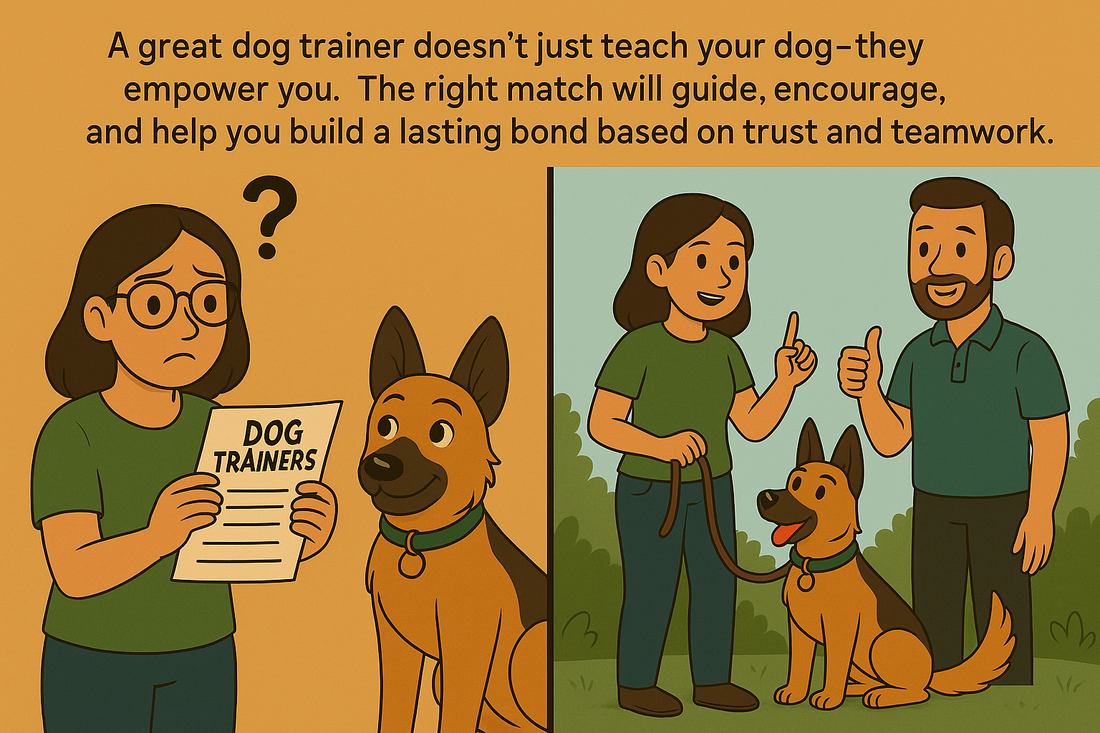
How to Find the Right Dog Trainer for You and Your Dog
Share
Choosing a dog trainer is an important decision that can shape your dog’s behaviour and the bond you share. But with so many options, how do you find the perfect match for both your dog’s needs and your own personality?
Here’s a guide to help you identify the right dog trainer, ensuring a positive, productive experience for you and your pup.
Step 1: Identify Your Training Goals
Before searching for a trainer, take time to define what you’re looking to achieve. Different trainers specialize in different areas, so being clear about your goals helps narrow your search.
Ask yourself:
- Are you addressing a specific behaviour (e.g., leash pulling, barking, aggression)?
- Do you want basic obedience training, advanced skills, or specialty work like service dog training?
- Is your focus on strengthening the bond with your dog or preparing for specific events or situations?
Knowing your goals will guide you toward trainers with the right expertise.
Step 2: Research Training Methods
Dog trainers use a variety of techniques, and it’s important to find someone whose philosophy aligns with your values and comfort level.
Common approaches include:
- Positive Reinforcement: Reward-based methods that focus on reinforcing good behaviour.
- Balanced Training: A mix of rewards and corrections, often used for specific challenges.
- Force-Free Training: Techniques that avoid punishment entirely, focusing on building trust.
Take time to learn about different methods and consider what feels right for you and your dog. Positive reinforcement is often a great choice for building trust and fostering long-term success.
Step 3: Look for Qualifications and Experience
Not all dog trainers are certified, but those with credentials or significant expertise often demonstrate a commitment to professional development and ethical standards. Trainers with balanced, force-free, or specialized approaches may have certifications or affiliations from different organizations.
Some certifications and organizations to look for include:
- Force-Free/Positive Reinforcement Certifications:
- CPDT-KA (Certified Professional Dog Trainer - Knowledge Assessed)
- Karen Pryor Academy (KPA-CPT)
- IAABC (International Association of Animal Behaviour Consultants)
- Balanced Training Certifications and Influences:
- IACP (International Association of Canine Professionals)
- NADOI (National Association of Dog Obedience Instructors)
- Michael Ellis School for Dog Trainers
- Nino Drowaert (STSK9): Known for his expertise in working with high-drive breeds, Nino emphasizes structured training, motivational techniques, and clear communication. His methods are a great fit for those seeking balanced training approaches, especially for working dogs or dogs with high energy and drive.
When evaluating a trainer’s qualifications, consider their philosophy and whether their methods align with your goals and values. If you're inspired by trainers like Nino, you may want to look for someone who integrates similar motivational and structured techniques.
Step 4: Evaluate Personality Compatibility
Training isn’t just about your dog, it’s also about how well you and the trainer work together. A good trainer should make you feel comfortable, respected, and heard.
Consider:
- Communication Style: Do they explain things clearly and answer your questions patiently?
- Empathy: Do they understand your challenges and offer solutions without judgment?
- Energy Level: Are they calm and encouraging, or firm and directive? Match their energy to what works best for you.
If possible, schedule a phone call or consultation to get a sense of their personality and approach.
Step 5: Observe a Training Session
Many trainers offer group classes or private sessions you can observe before committing. Watching them in action provides insight into their methods and interactions.
Things to look for:
- Are they patient and kind with the dogs?
- Do they explain techniques clearly to the dog owners?
- Are the dogs and owners enjoying the session?
If anything feels off, like excessive corrections or unclear instructions, it may be a sign to keep looking.
Step 6: Check Their Track Record
A good trainer will have testimonials or references from satisfied clients. Look for reviews online or ask for recommendations from friends, veterinarians, or local pet communities.
Questions to ask:
- Have they successfully addressed issues similar to yours?
- Are clients happy with the results and overall experience?
- Do they communicate well and provide ongoing support?
Step 7: Assess Their Approach to Your Dog
Every dog is unique, and the right trainer will tailor their methods to your dog’s personality, breed, and needs.
During your first session:
- Does the trainer take time to assess your dog’s behavior and temperament?
- Are they adaptable if a method isn’t working for your dog?
- Do they prioritize your dog’s emotional well-being?
Trainers who push too hard or don’t adjust their methods may not be the best fit.
Step 8: Clarify Logistics and Expectations
Before committing, ensure the trainer’s services align with your schedule, budget, and preferences.
Consider:
- Format: Do they offer group classes, private sessions, or virtual training?
- Location: Are sessions held at their facility, in your home, or a public space?
- Cost: Are rates clear and reasonable for the services provided?
- Support: Do they offer follow-up resources or ongoing support after sessions?
Step 9: Trust Your Instincts
If something doesn’t feel right, don’t be afraid to walk away. A good trainer will welcome questions and be transparent about their methods and philosophy.
Remember, finding the right trainer is about more than just qualifications, it’s about building a partnership that benefits you and your dog.
The Right Trainer Makes All the Difference
Investing time in finding the right trainer can lead to remarkable progress for both you and your dog. With a clear understanding of your goals, thorough research, and a focus on compatibility, you’ll set the foundation for a successful training journey.
Your perfect trainer is out there, someone who will guide you, encourage you, and help you and your dog become the best team you can be.
Have questions about choosing a trainer or want to share your experience? Leave a comment below!